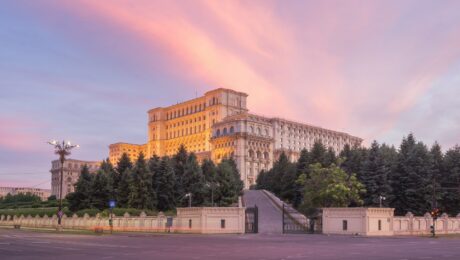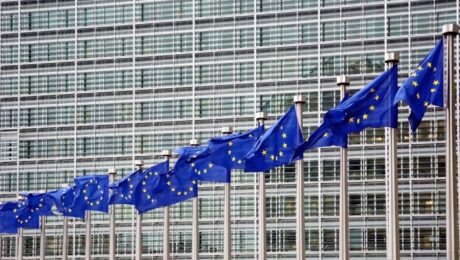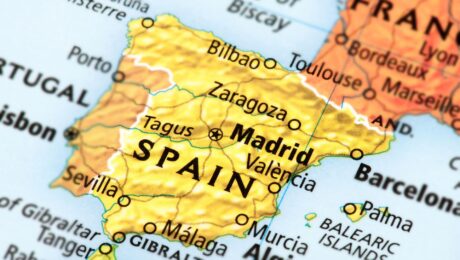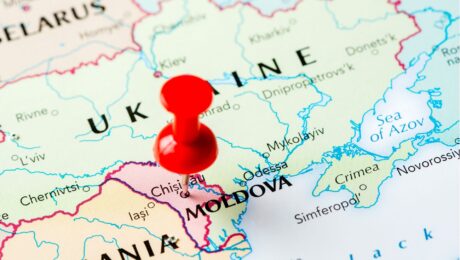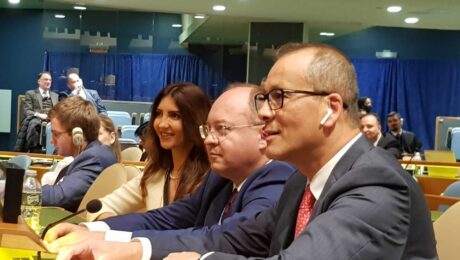Anti-Trump Official Appointment as Vice Prime Minister: Romania’s Symbolic Rebellion for Troop Withdrawal or Strategic Misstep?
Romania’s latest political reshuffle has elevated Oana Gheorghiu to the position of Vice Prime Minister, a move framed domestically as a victory for democratic reform and alignment with Western values. Yet in diplomatic circles, the appointment is being read quite differently, as a calculated signal to Washington and Brussels at a moment when Romania’s credibility as a stable partner is quietly eroding.
The timing could not be more delicate. Barely weeks after the United States announced a partial troop withdrawal from Mihail Kogălniceanu Air Base, the Romanian government has turned to one of its most outspoken anti-Trump voices to represent its new direction. On paper, this seems like a reaffirmation of transatlantic loyalty. In practice, it risks deepening the perception that Romania confuses political symbolism with strategic substance.
The Anti-Trump Identity as Political Armour
Oana Gheorghiu’s career has been built on civic activism and reformist rhetoric. Her open criticism of MAGA-style populism, once seen as fringe, has now become a badge of legitimacy for Bucharest’s elite. Within the government of Prime Minister Ilie Bolojan, Gheorghiu embodies a deliberate attempt to brand Romania as the anti-populist, pro-rule-of-law outpost of Eastern Europe.
But this political posture comes with risk. While her nomination appeals to Western liberal audiences, it also underscores the growing performative nature of Romanian governance, where the vocabulary of reform is embraced for international approval while domestic institutions stagnate.
The irony is striking: Gheorghiu’s rise is less the result of reform than of the collapse of Romania’s traditional political alternatives. With the opposition fragmented and public confidence drained by the cancellation of last year’s presidential elections, the ruling coalition needed a moral symbol, not necessarily a strategist. Gheorghiu offered both a cause and a face.
The Washington Connection and Disconnection
Her appointment came just as Washington confirmed that U.S. forces in Romania would drop from 1,700 to around 1,000, a decision reflecting a loss of operational trust rather than a loss of interest. The Biden-Trump transition of military focus toward Poland and the Indo-Pacific had already begun; Romania’s instability only made the choice easier.
Now, the optics are problematic. While Bucharest celebrates its “anti-Trump” Vice PM, Washington under President Trump’s second administration is recalibrating alliances in hard, pragmatic terms. Within this reality, moral signalling carries little diplomatic weight.
By appointing an official whose name has become synonymous with resistance to Trumpism, Romania may have won applause from NGOs and editorial boards, but lost quiet influence in the rooms where policy is actually made.
Between Conviction and Convenience
It would be unfair to reduce Gheorghiu’s appointment to pure opportunism. Her record of civic involvement and advocacy for hospital reform and transparency is genuine. Yet the broader context cannot be ignored. This government needed to look “pro-Western” again after the chaos of the cancelled elections and Romania’s steady decline in credibility among its partners.
Thus, Gheorghiu’s rise functions as a symbolic insurance policy, a way for Bolojan’s cabinet to rebrand itself as reformist without confronting the structural issues that have alienated both voters and allies: corruption fatigue, bureaucratic paralysis, and an increasingly theatrical political discourse.
Europe Applauds, Washington Watches
In Brussels, the appointment has been quietly welcomed. It fits the EU’s preferred narrative of Romania returning to its progressive track, distancing itself from nationalist rhetoric. Yet even among European diplomats, there’s scepticism about the country’s ability to translate gestures into governance.
In Washington, the tone is cooler. The administration may appreciate Gheorghiu’s stance, but the timing is awkward. Anti-Trump positioning as a political brand plays poorly with the current U.S. leadership. Romania’s government, by overplaying its ideological loyalty to “democratic values,” risks appearing tone-deaf to the geopolitical pragmatism that now defines U.S. foreign policy.
Romania’s Perpetual Search for Validation
The deeper issue is not Gheorghiu herself; it is Romania’s political reflex to seek legitimacy through external approval. Whether from Washington, Brussels, or NGOs, the pattern is consistent: substitute internal credibility with external validation.
Gheorghiu’s appointment fits perfectly into that pattern. It tells allies what they want to hear, but says little about what Romania intends to do. The country’s defence posture remains underfunded, its institutions underperforming, and its strategic narrative reactive rather than visionary.
Conclusion: Symbolism Without Strategy
Oana Gheorghiu’s promotion may mark a moral triumph for reformists, but it exposes the intellectual exhaustion of Romania’s political class. When symbolism becomes the only strategy left, even the most principled figures risk being used as props in a performance meant for foreign audiences.
Romania doesn’t need another symbol; it needs a direction. Until that changes, the vice-premiership of Oana Gheorghiu will remain exactly what it appears to be, a headline of hope masking a government without a plan.
- Published in News
The 3% Mandate: Romania’s Lack of Trust in Political Class Paralyzes Good Governance
A recent nationwide IPSOS poll, reflecting public sentiment in October 2025, has delivered a seismic shock to Romania’s democratic foundations: only 3% of citizens express trust in their political class. This figure is not just a measure of popularity; it is a declaration of a profound and systemic crisis of legitimacy that actively sabotages the very concept of Good Governance in Romania.
The data reveals the depth of public disillusionment: an overwhelming 82% of Romanians state they have no confidence in politicians. This scepticism extends to key executive bodies, with confidence in the sitting government plunging to a mere 6%. Such extreme political alienation makes the implementation of sound policy, necessary for sustained development, nearly impossible.
The Vicious Cycle of Distrust
Good Governance is built upon fundamental pillars: Transparency, Accountability, Effectiveness, and Responsiveness. When public trust collapses to 3%, the mechanism of effective governing breaks down across every one of these axes:
Sabotaging Accountability and Transparency
In a climate of profound distrust, the public operates on a default assumption that political action is driven by self-interest and corruption, not public service. When this cynicism becomes the national norm, genuine efforts towards accountability are dismissed as superficial or performative.
- Policy Resistance: Any long-term strategic plan—be it fiscal consolidation, administrative reform, or energy transition—is instantly viewed through a lens of suspicion. A government is unable to implement necessary, but initially unpopular, reforms because it lacks the public mandate (trust) required to ask citizens to accept short-term costs for future benefits.
- Corruption Normalisation: With over four-fifths of the population expressing complete non-confidence, the fight against corruption loses its popular resonance. For many citizens, corruption is no longer an anomaly to be eradicated, but an inherent, expected feature of the political system.
Undermining Effectiveness and Compliance
The lack of trust directly impacts the state’s ability to govern efficiently, turning administrative challenges into political obstacles.
- Erosion of Tax Compliance: Good governance requires citizens to respect the rule of law and willingly comply with state regulations, notably tax obligations. When the public perceives that their money is funnelled to an untrustworthy elite, they are far less likely to cooperate. The 3% trust level is inherently linked to high rates of tax evasion and reluctance to comply, starving the state of the resources needed to deliver quality public services.
- Instability and Populism: This systemic failure creates fertile ground for anti-establishment, populist, and radical movements. These factions capitalise on the public’s anger, offering simplistic, short-term solutions that further destabilise the political environment and discourage the complex, long-term policy-making essential for Good Governance.
The Imperative for a Good Governance Overhaul
The 3% trust rating is not a call for better PR; it is a demand for transformation. To survive this crisis of legitimacy, the political class must fundamentally reorient itself toward measurable Good Governance principles:
- Results-Driven Mandate: The focus must shift from political maneuvering to delivering tangible results in public services—modernizing healthcare, improving infrastructure, and streamlining bureaucracy. Visible competence is the only currency that can begin to repurchase public faith.
- Uncompromising Integrity: Political parties must take decisive, public action against corruption within their ranks, demonstrating that they place institutional integrity above party loyalty.
- Structured Dialogue: Governance must become genuinely responsive. This means establishing effective mechanisms for citizen and stakeholder consultation, moving past superficial debates, and ensuring that public feedback fundamentally shapes legislative output.
The extreme lack of faith reflected in this poll signals that the old political operating model is obsolete. For Romania to secure its democratic stability and fulfil its economic potential, the political class must acknowledge the 3% as its final warning and embark on a sincere, radical path toward transparent and accountable Good Governance.
- Published in News
Romania: A Full-Fledged Member of the Schengen Area
December 12, 2024, marks a historic milestone for Romania! After years of dedication and unwavering commitment, our nation has officially become a full member of the Schengen Area. This momentous occasion signifies the culmination of tireless efforts by the Romanian government and a resounding affirmation of our country’s unwavering dedication to European integration.
Unprecedented Opportunities Await
By joining the Schengen Area, Romania unlocks many economic and social advantages. Eliminating internal border controls fosters seamless movement of goods, services, and people across the region. This, in turn, stimulates trade, tourism, and investment, propelling Romania’s economic engine to new heights.
Enhanced Security for All
Membership in Schengen doesn’t just signify economic benefits; it also strengthens regional security. Romania brings its expertise and unwavering commitment to the table, contributing actively to a more robust and unified European security architecture.
A Testament to Romanian Excellence
This momentous achievement is a testament to Romanian authorities’ unwavering dedication and professionalism. Their tireless efforts in bolstering border security, the rule of law, and law enforcement have been instrumental in securing Romania’s rightful place within the Schengen zone.
A Brighter Future for Europe
Romania’s full integration into Schengen is a victory for our nation and all of Europe. It reaffirms the unwavering strength of European unity and collaboration, paving the way for a more prosperous and secure future for the entire continent.
Join Us in Celebrating!
Lobby Romania invite all Romanians to celebrate this historic occasion. Romania’s full membership in Schengen signifies a new chapter for our nation – a chapter brimming with opportunity, progress, and a prosperous future for all.
- Published in News
Diplomacy Done Right: How Leaders Can Avoid Missteps and Protect International Relations
Even a minor mistake can have significant consequences when representing a country on the world stage. Recently, Romanian President Klaus Iohannis made headlines for an unfortunate slip at a European summit. He misstated the capital of a neighbouring nation. This simple error quickly drew criticism, and some worry it may strain Romania’s already delicate relationship with Hungary. Such moments offer valuable lessons in diplomacy and leadership, especially in regions with complex histories like Central and Eastern Europe.
Why Details Matter in Diplomacy
Diplomacy is all about respect, attention to detail, and understanding the subtle nuances that define each culture and country. When a leader misnames a neighbouring country’s capital, it can come across as uninformed or dismissive. This perception is susceptible to Romania and Hungary, two countries with close geographical ties and shared economic interests but also a complicated past. Even a tiny error can set off ripples, impacting how citizens, politicians, and businesses view their cross-border relationships.
Setting the Tone: Why Leaders Must Lead by Example
As the public face of their nation, leaders are responsible for representing their country with accuracy and grace. When a mistake happens at this level, it’s not just about one individual—it reflects on the nation as a whole. President Iohannis’s misstep is a reminder that diplomatic conduct has real consequences. These moments set the tone for how other nations view Romania and how Romanians see themselves in the global community.
How to Avoid Diplomatic Blunders
High-profile figures can—and should—take steps to prevent these mistakes. Leaders like President Iohannis can set a better example by embracing a few key practices:
- Preparation is Essential: Knowing the facts about the countries involved in a meeting or event shows respect and builds confidence among diplomatic partners. It’s crucial to get these basics right.
- Sensitivity Training: Leaders benefit from training that gives them a grounding in the culture and norms of the countries they work with, even if it’s just a refresher before a big event.
- A Detailed Review: Speechwriters and advisors play a crucial role here. Reviewing all the small details, including country names and titles, can prevent embarrassing moments.
- Owning Mistakes: When a misstep does happen, a prompt apology goes a long way. Acknowledging the error shows humility and respect for those affected.
What This Means for Romanian-Hungarian Relations
Romania and Hungary have a long history together, and while relations have improved, they remain sensitive. Simple diplomatic missteps can stir up old wounds, potentially creating friction in a relationship that’s been carefully managed over the years. For Romania’s leaders, it’s a reminder that fostering trust and respect requires vigilance, especially with neighbours who share complex histories.
Moving Forward: Protecting Romania’s Image on the World Stage
Moments like these underscore the importance of preparation, respect, and a clear commitment to getting the details right. Romania has an opportunity to reaffirm its dedication to thoughtful and respectful diplomacy, ensuring that future interactions reflect a strong, well-prepared, and globally mindful nation.
- Published in News
Restoring Trust: The Need for Honest Communication in the Wake of Storm Ashley
The Romanian government’s recent handling of Storm Ashley has raised significant concerns regarding transparency and accountability in public communication. As the storm approached, authorities labelled it a „cyclone,” creating a narrative of impending disaster not reflected in the actual weather conditions. This manipulation of information misled the public and undermined trust in governmental advisories.
Misrepresentation of Storm Conditions
Despite producing only light rain and weak winds, the Romanian government’s declaration of Storm Ashley as a cyclone has sparked outrage among citizens and experts alike. Meteorological specialists have pointed out that such a classification was unfounded, as the storm did not exhibit typical cyclone characteristics, such as closed isobars indicating low atmospheric pressure. This discrepancy raises questions about the motivations behind such exaggerated communications, especially when neighboring countries did not report similar conditions.
The Consequences of Misinformation
The implications of this misinformation are profound. By framing a relatively benign weather event as a catastrophic threat, the government risks fostering public panic and skepticism. Citizens may begin to disregard future warnings if they perceive them as exaggerated or manipulative. As one expert noted, “To consider these normal torrential rains as ‘the storm of the last 20 years’ means meteorology is dead”2. Such statements highlight the potential long-term damage to public trust in meteorological advisories and government communications.
Accountability and Transparency
The lack of accountability for these misleading statements is alarming. The government must be held responsible for its communications, particularly in times of crisis when accurate information is crucial for public safety. Authorities should prioritize transparency and honesty to rebuild trust with citizens. Past experiences have shown that failure to provide clear and accurate information can lead to dire consequences during emergencies.
A Call for Responsible Governance
Moving forward, it is essential for the Romanian government to adopt a more responsible approach to crisis communication. This includes:
- Providing Accurate Information: Authorities must ensure that public advisories reflect actual conditions to avoid unnecessary panic.
- Fostering Public Trust: Transparent communication can help restore confidence in governmental institutions, ensuring that citizens take future warnings seriously.
- Implementing Accountability Measures: Establishing mechanisms to hold officials accountable for misleading communications can prevent similar incidents in the future.
In conclusion, while it is vital for authorities to prepare citizens for potential threats posed by weather events, this must be achieved through honest and transparent communication. Only by doing so can we maintain a well-informed public that responds appropriately during times of crisis. The recent handling of Storm Ashley serves as a critical reminder of the importance of integrity in governmental communication—an integrity that must be restored if we are to face future challenges effectively.
- Published in News
Political marketing stunt: Official Complaint for the Missing of Romania’s President
Romania’s President is missing – this is what an Opposition deputy in Romania complained about when he went to the police station to file a missing person case. This could be the best political marketing stunt in years, and the Opposition Party AUR did it. The party is seen as a nationalist, far-right and extremist, isolated in Romania’s political scene for this labelling. However, their actions make all the political marketing experts take notes.
Romania’s President has been missing since December 18, the last day he was publicly seen. Thirty days later, AUR deputy Adrian Axinia went to a police station in Bucharest and filed a formal complaint for the missing person. The case was related to prime-time news by all major TV stations in Romania and all the major news platforms.
Also, the other major Opposition party, the so-called Reformists, USR, posted on Facebook a visual asking for any information about the missing President Johannis.
These complaints are pure political marketing, not else. Romania has four elections in 2024, and the campaigns have just started. However, Johannis is a fake target, as he is in his second presidential term. The real target is the Liberal Political Party – PNL, the now ruling party, and the Socialists. PNL is the party initially supporting Johannis for the presidential elections and his ten-year presidential mandate.
The Opposition exploits citizens’ complaints about their president, among which his notorious missing from office to take long and exotic vacations is only one of them.
- Published in News
Romanian Government Succeeds in Making Dual Citizenship Possible for Romanians in Spain
Due to the Romanian Government’s lobby, Romanians living in Spain will soon have dual citizenship. The Spanish Prime Minister, Pedro Sanchez, will arrive in Romania at the end of January to sign the agreement between the two governments. The two parties have already agreed on the document’s final version.
This success started in 2022 when a joint meeting of the Spanish and Romanian Governments was organized in Spain. At that moment, the Romanian part asked for the Romanians living in Spain to be allowed to have dual citizenship. After that meeting, dual commissions have been established to work on the agenda to fulfil what is now possible.
According to the existing law, the Romanians in Spain who want to get Spanish citizenship must give up their Romanian citizenship. After the two governments sign the agreement, they will get a second citizenship without giving up the Romanian one. Also, they will get jobs, such as in the Spanish Army, administration or police.
So far, this privilege of dual citizenship has been offered only to French and Portuguese nationals, and Romania has become the third country Spain offers this.
More than 1 million Romanians live in Spain, while around 600,000 have residency. Romanians form one of the largest communities of foreigners in Spain.
- Published in News
Romanian Voted as Moldova’s National Bank Governor
Anca Dragu, a Romanian senator, was voted on Friday, December 22, as the new Governor of Moldova’s National Bank. This is quite an accomplishment for the Romanian lobby and a step forward for the long-time goal of getting the two sister countries closer.
Anca Dragu has a solid background for this position. As an economist, she was appointed Minister of Finance in Romania between November 2015 and January 2017 during the rule of the Technocrat Government. Also, she was the first woman in Romania to become Speaker of the Senate. Also, she worked as an economist at the National Bank of Romania and an economic analyst with the European Commission and International Monetary Fund.
The interesting political game, noted in a comprehensive analysis of the context by Valahia News, is that the Moldovan Socialists voted along with PAS – Action and Solidarity, the party supporting Moldova’s President Maia Sandu, to oust the former governor from office and instate Anca Dragu.
Beyond any political meaning, this is also a step from what both governments intend to accomplish in the foreseeable future. Both sister countries were part of Great Romania, a territory that covered the Republic of Moldova, the southern part of Ukraine, and partially the northern part of Bulgaria. The two countries still yearn, more or less, to get back together as one, and there are exciting movements from both sides, such as to name, appoint or vote. officials from the sister country, precisely what happened with Anca Dragu.
In this context, one theory circulating in Romania is to have elected as president the current president of Moldova, Maia Sandu. This would be another way of getting the nation back together. And, if you have a passion for history, this is how the Union of the Romanian provinces in 1600 and the one in 1859 were accomplished – by imposing or voting the same ruler in all or at least two of them. So, it would just be history repeating itself.
Also, another theory is to have the two countries back together after Moldova joins the European Union, a process which might take at least 5-10 years to finish. Also, this possibility requires another step: for this political decision to be backed by all or the majority of the European member states. However, this hasn’t happened so far, so it would be the first time two European Union states would do this.
However, we also have to say that there isn’t 100% backing of the Union between the two sister countries, not even within their borders. Only half the Moldovan population would vote for a Union, while in Romania, the percentage is more significant.
Either way, this process seems to have its agenda, and the Romanian and Moldovan politicians follow it. In the long run, Moldova would be a more experienced country at the moment it will join the EU. Moldova could learn much from Romania’s expertise in the field and would be able to play its cards better when the moment comes. Also, a larger country, with 23 million inhabitants, would do better than one with 3 million in a European Union where the economic and voting power matters the most.
- Published in News
Romania Wins over Russia and Imposes Judge to UN Court of Justice
The former Foreign Minister Bogdan Aurescu was elected on Thursday, November 9, as a judge of the UN International Court of Justice. Aurescu was nominated for this candidacy by Romania and nine other countries – the Netherlands, Portugal, Sweden, Latvia, Italy, Poland, Peru, Estonia and Bulgaria. He competed for the Eastern Europe position with Russian judge Kirill Gevorgian, supported by Russia, China and Belarus.
Bogdan Aurescu obtained 117 votes in the General Assembly, while Gevorgian only 77 votes. This is a historic defeat for Russia, which hoped to have Gevorgian re-elected. It is the first time in the history of the UN International Court of Justice that the Russian representative is not re-elected.
This is seen as a diplomatic win for Romania and all the European Union members who oppose Russia’s aggression.
In the Security Council, Aurescu obtained nine votes.
All the elected judges on Thursday, November 9, are:
- Bogdan Aurescu Romania
- Hilary Charlesworth Australia
- Sarah Cleveland
- Juan Manuel Gómez Robledo Mexico
- Dire Tladi South Africa
Bogdan-Lucian Aurescu was Romania’s Minister of Foreign Affairs between 4 November 2019 and 15 June 2023 and 24 November 2014 and 17 November 2015. A career diplomat (since 1996), he has the diplomatic rank of Ambassador (since 2014). Between 6 May 2016 and 4 November 2019, he was the Presidential Advisor for Foreign Policy of the President of Romania. On 15 June 2023, he was again appointed as Presidential Advisor for Foreign Policy of the President of Romania.
- Published in News
Romanians’ Trust in EU Collapses
According to Valahia News, the Romanians’ trust in the European Union collapses. This is what the latest Eurobarometer says about the trust the Romanian people lost, especially during the last two years in the EU and the European institutions.
In particular, trust decreased by roughly 10% during the past two years. Only 46% of Romanians see participation in the EU favorably, down from 55% in 2020. Romania has significantly slipped below the EU average in this area, which is currently 62% and is expected to rise from 59% in 2020.
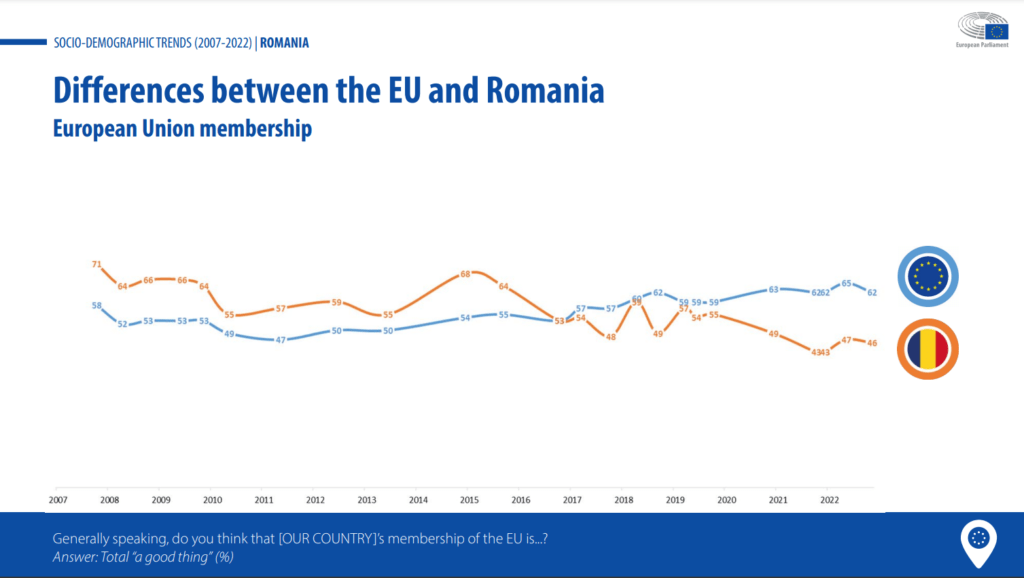
Not only that but the proportion of individuals who still believe that being a part of the EU benefits them fell from 72% in 2020—which was and remains the average for Europe—to 62% presently. In just two years, there has been a 6% decline.
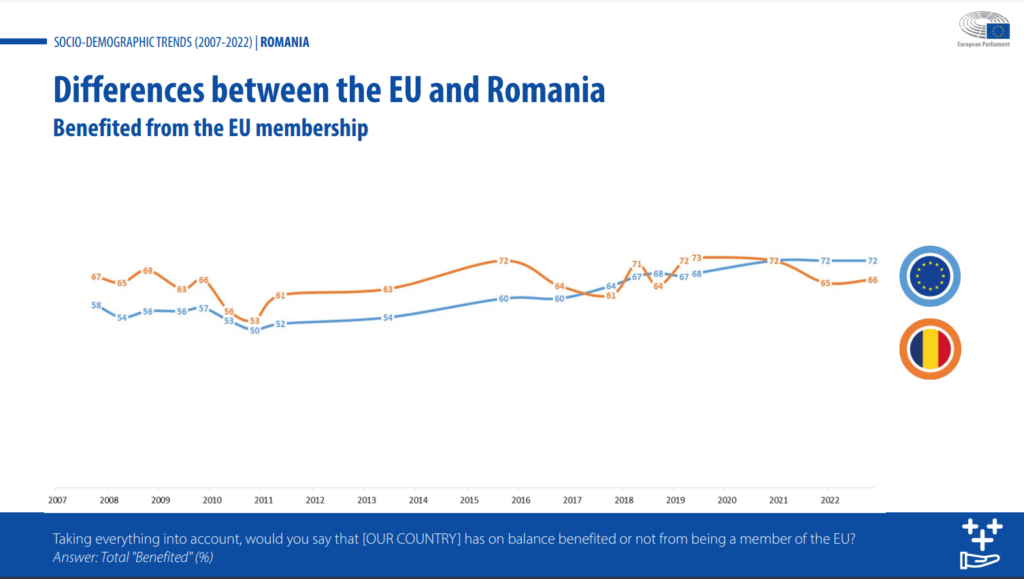
39% of Romanians who were asked why they valued their country’s participation in the EU said it was for the employment prospects. This is due to the fact that millions of Romanians labor overseas. On the other side, the study reveals that Romania falls well short of the EU average in terms of valuing the EU’s economic contribution to the development of the nation or its contribution to restoring peace and security in Romania. Given the EU’s failure to solidify the peace in the region, it is understandable why they think this way. The Romanian people don’t notice much of an impact from the EU, just from NATO, as the so-called „special operation” is taking place close by.
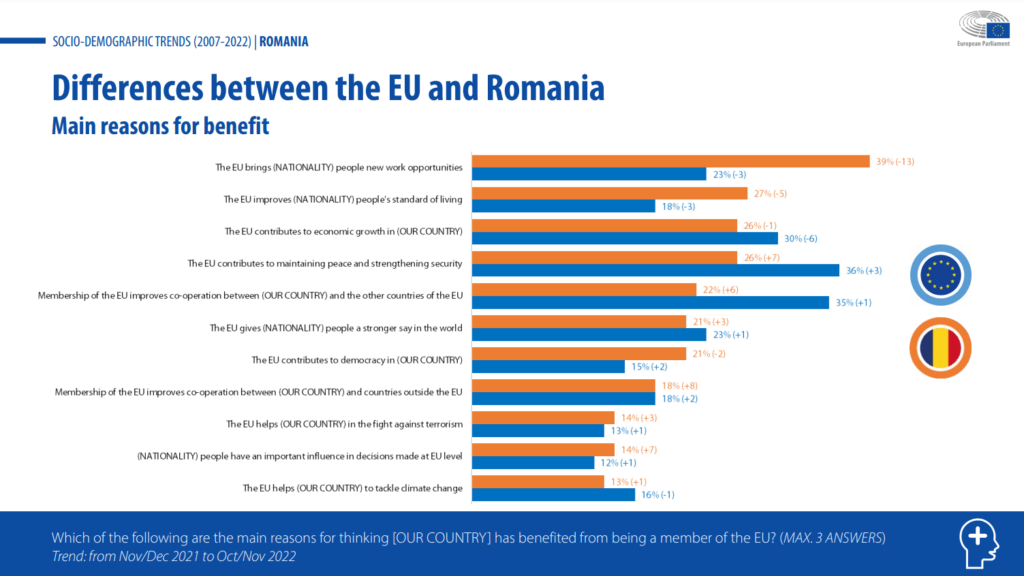
How did Romanians lose trust in their leaders and the EU and why did this happen?
Although the pandemic may have been a major factor in this, we must admit that Romanian officials may have had a part to play. The lawmakers merely seemed to the Romanians as a group of individuals who faithfully carried out EU directives. Romania implemented one of the most autocratic regimes during the pandemic to impose quarantine regulations on its inhabitants. The government once sent personnel armed with heavy machine guns and military trucks onto the streets to deliver a straightforward message: we set the rules now!
Romania also demonstrated unrestricted devotion to Brussels by spending billions and purchasing tens of millions of vaccination shots, just to dispose them now that they had expired. These may be the main reasons why the country is losing trust in the EU.
Also, the recent developments at the European level made more Romanians reject European values. While keeping Romania out of Schengen, European politicians should consider that the country could retaliate. Boycotts against Western companies are underway in Romania. Instead of understanding the people and trying and fulfill their rightful demands, politicians in Bruxelles blame the Russian rhetoric whenever they spot opposition to the European institutions.
Now, the Romanian Government and the country’s elites reap what they sow: the lack of trust of Romanians in the European institutions is only the consequence of how the politicians in Bruxelles and Bucharest treated the population. Suppose anyone in Bruxelles would like to change the current trend and the widening gap between the Romanians and the EU. In that case, they should try and understand that it’s not Russia to be blamed but their own decisions and behaviour.
- Published in News
- 1
- 2


